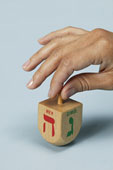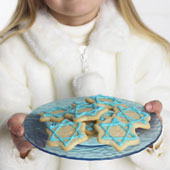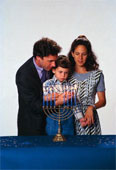Jews On The Web
IMPORTANT: Some of these broadcasts require you to use Chrome, Firefox or other browsers (not Internet Explorer) that properly utilize Flash/other video streaming methods.

![]()
Differing Views of Jewish Living
By: Jacob Lumbroso
Defining or describing a Jewish lifestyle assumes that one understands the meaning of Jewish identity. What constitutes Jewish living is therefore connected with the age old question of who is a Jew or what constitutes Jewishness. This fact causes Jewish living to vary substantially in contemporary Jewish society, in and outside of the land of Israel. Determining what is distinctly Jewish can be troubling endeavor because it affects the manner in which one lives his or her live in areas of morality, politics, family, and inter-group relations.
Some have chosen to articulate Jewish living in terms of those elements that emphasize the historic connection of the Jewish people to the land of Israel above any purely religious concerns. This of course was reflected in the Zionist movements of the 19th and 20th centuries and continues to manifest itself in part in both the civil religious practices of Israeli society and the generally secularized attitudes of Israeli Jews toward Judaism. Others have chosen to define Jewish living in terms of a racial or cultural distinctive viewing Jewishness as primarily an ethnic identity since ethnic communities share a sense of common origins, claim a common and distinctive history, and possess a sense of collective uniqueness and solidarity, and a distinctive lifestyle.
More traditionally inclined movements maintain definitions of Jewish living based upon classical approaches to Halakhah. At the opposite end, movements like Reform Judaism which emphasize individual autonomy often radically depart from historic notions of what Jewish living has meant. “Jewish values” have replaced traditional understandings of Jewish living and in American society such values have largely morphed into the phenomena of Jewish liberalism and social action.
Each of these perspectives provides justification for its definition of Jewish living. Each of these positions also encompasses a number of strengths and weaknesses which fail to fully appreciate the complexity of Jewish life in light of classical Jewish sources.
About the Author
Jacob Lumbroso is a world traveler and an enthusiast for foreign languages, history, and foreign cultures. He also is a music fanatic and has a website http://musicalinstrumentaccessoriesshop.com/ where he provides information on Musical Instrument Accessories.(ArticlesBase SC #1181735)
Article Source: http://www.articlesbase.com/ - Differing Views of Jewish Living
![]()
The Significant Effort Of Jewish Education Towards Children
By: sampollard
Early childhood education is not all about providing the right experiences at the right stage of child's development but also a guide for preschool teachers and home-schooling parents to give preschools student the best start in life. . Preschool curriculum activities should provide a structured, fun, and natural approach to early childhood education.
The supportive families and faculty members have to work together with community to develop bright
future of the students to attain maximum potential from them and develop them as lifelong learner. The environment is well maintained and helpful for students to develop high morals of the life.
The basic foundation of Hillel Jewish education system is based on torah mishamayim. The Hillel program is grounded by the three primary concepts of Torah, Avodah or Prayer and Gimilut Chassadim or Charity.
One of primary objectives is to instill a deep knowledge, understanding and ability to analyze the Torah in
order to find within it practical everyday lessons. These include the pleasure of such basic concepts as pride versus humility, materialism versus spirituality, Lashon Hara versus productive speech and all of which students may identify with as conventional norms.
Hillel education system shows how the torah is an essential guide at various stages of life at regular interval of the study. From various stages of life, it supports people in their roles of child, sibling, parent, spouse, as well as school roles
of student, teacher, and administrator. It is even present in the daily interactions of business world. Hillel students will learn the secular values and importance of torah in daily life.
Hebrew language has also significant part in the Hillel's experience. In addition to serving as an key tool for the study of the written and oral Torah, it also is taught for the purpose of communication with Jews in Israel and those who inhabit in diverse communities around the world. It serves as a window to contemporary
Israeli culture and society, strengthening vibrant Zionistic community.
Hillel teaches an individual, the communal process of prayer, as it is described in the Code of Jewish Law. As Judaism emphasizes the need for man to communicate with G-D, Hillel teaches students to praise G-D, to ask Him for achievement of their needs and then to offer Him thanks.
This is satisfactory for every parent to imagine and to see their child who has high moral values and even confident towards life. They will also gain
good self-esteem, good thinking skills, well developed senses and awareness , creativity and able to socialize, read, write and communicate ideas. Isn't it a fantastic way for overall growth of a child?
About the Author
Author is an executive with hillel-nmb.org. For more information visit: Jewish preschool
(ArticlesBase SC #1996784)Article Source: http://www.articlesbase.com/ - The Significant Effort Of Jewish Education Towards Children
![]()
San Antonio Maccabi Games:
A Truly Magical Experience
By: Terri Akman
Spending five days with my family watching our youngest son playing soccer in the San Antonio Maccabi games was an incredible experience. I’ve had the great fortune of attending three other Maccabi games, in Montreal, Greater Washington, and Baltimore, to root on each of my three children. I wondered if the experience would get old by the fourth go-round, but I am pleased to report that it was as special as ever.
The Maccabi games are about sports, but the athletic competition is merely the venue that draws these teenaged athletes together. For both the participants and the lucky family members who get to root on the sidelines, the games conjure feelings of great pride. We are proud of our Jewish heritage, proud to live in South Jersey, and proud to become part of this community of spirited teens from all over the world. Sure, these kids competed against each other, and the competition was fierce. But at the end of each game, they chatted with their rivals, and during social events throughout the week, they formed solid friendships. All of the athletes in attendance felt a mutual respect.
Seven of the eleven boys on my son’s team had played together in the Maccabi games held in Baltimore two years ago. While they live in five different towns and attend different schools, the wonderful bond they previously formed remained strong. The new members of the team fit right in, and together these Sexy Jews, as they dubbed themselves, had a blast. The strangest thing about this team was that two of the boys are named Brady….not a very popular name for a teenager. The opponents were confused when the spectators gave Brady a shout-out, because one Brady was a forward the other one was in goal.
All but two of the young men on the team were fortunate to have family members in San Antonio to support them. The parents all shared in the excitement and enthusiasm of the games, and we all became temporary best friends. Even my 21 and 19 year olds enjoyed the camaraderie of the group, although they rolled their eyes more than once during our seemingly continual “Jewish Geography” go-rounds. We also brought Grandma along with us to kvell over her grandson.
Despite temperatures reaching 104 degrees (according to the rental car thermometer,) there were plenty of ways to stay cool. The JCC had a great fitness center and incredible swimming pool, which our family gravitated to each afternoon when the games were complete. We discovered that the residents of San Antonio must be among the nicest people on earth. Everyone was friendly, helpful, and welcoming. The only drawback was the never-ending loops of highways that were confusing to navigate at first. When my son broke his cleats and we needed to get him a new pair, it took an hour to find the Sports Authority which we realized was just 10 minutes away.
The Coles, the family who hosted our son, were incredible. They housed three 15 and 16 year old boys, feeding them, doing their laundry and carting them from venue to venue. The boys formed an instant bond with their temporary family and were sad to say goodbye. Phyllis and Steve went over and above, carting them to favorite restaurants, serving up venison that Steve had hunted, (that was surely a new experience!) and fortifying them with plenty of Gatorade and protein bars.
The boys’ teamwork showed as they handily won game after game. Their coaches, Chuck Lampitt and Ed Eichen were incredible cheerleaders, always positive and supportive of all the boys. The JCC staff, including Rob Kiewe and Emily Lieberman were not only efficient, but managed to keep eleven 15 and 16 year olds on the straight and narrow throughout.
The final medal game was a nail biter. The mid-day heat radiated off the turf field, practically wilting the sweat-soaked athletes. In the end, Los Angeles prevailed 2-1 to win the gold and South Jersey took silver.
The boys were proud of themselves for their success, but the silver medal was really just the icing on the cake. It was the relationships they made and experiences they enjoyed that made these Maccabi games a time they will always remember.
About the Author
I produced the Romper Room and Friends TV show and Bowling for Dollars when I worked for Claster Television in the '80's and '90's. With three kids of my own, I stopped working there in 1996. Today I am a freelance writer and preschool teacher and I am in the process of publishing my first book about preschool advice for parents. Check out my blog at www.preschoolteach.blogspot.com Please contact me at: terribakman@gmail.com
(ArticlesBase SC #1173039) Article Source: http://www.articlesbase.com/ - San Antonio Maccabi Games: A Truly Magical Experience
![]()
CHILDHOODMEMORIES Sought



We are actively seeking anecdotes and stories involving your Jewish experiences/ influences, when you were a child. --- You do not have to be a 'professional writer'; simply write from your heart! Share your Jewish upbringing.
Please send
them to us at:
thoughtsplus@jewsontheweb.com
Thank you!
![]()
Fighting With The Laundry
RABBI SIMCHA WEINBERG
Ever since I saw my father zt’l washing his Tzitzit, I have washed my own. Please understand; my siblings and I would battle each other for the merit of serving our parents and cleaning for them. The only things we were willing to just stand back and observe was my father preparing my mother’s Shabbat candles and his loading the car for one of our long trips from Toronto to Baltimore with all the items we carried downstairs: He was magically able to fit everything into the trunk. It was unbearable to stand and watch either of our parents wash a dish or load the dishwasher. So, the second I saw my father standing over the sink and scrubbing his Tzitzit, I ran to do it for him, but he wouldn’t let me. It was his way of honoring and beautifying the Mitzvah. He told me that keeping his Tzitzit clean was part of fulfilling the concept of “Beautiful Tzitzit.” “Why would I allow someone else to do it for me?” I got the message and have been washing my Tzitzit ever since.
I rejoiced when Neatzit were invented; comfortable cotton Tzitzit that can go in the washing machine. I only use threads that I spun many years ago, so I untie the strings from my new Tzitzit and tie my strings, of which I have no more. I have to be very careful with the strings. No problem: There are pockets on each corner in which to stuff the strings so they don’t get tangled up. You can put them in the washing machine and they come out beautifully…at least in theory.
My strings never stay in the pocket. So, I decided to use a lingerie bag. Didn’t work. I tie them up with a rubber band, but they still get all tangled. The final straw was when I took my Tzitzit out of the washing machine and they were rusty brown; dirtier than when I put them to wash. It seems that a water main broke and colored the water and my Tzitzit.
I mentioned my problem to a friend and he suggested that I should not be using the washing machine; “If the point is to act as did your father; you should still be washing them by hand!”
He got it wrong! The point is not to act as did my father, but to be actively involved in beautifying my Tzitzit, something I learned from my father. However, I still have to wonder whether using the washing machine is the same as washing by hand. It’s not enough to spend extra money buying the “best” Tzitzit; we have to actively make them beautiful, including the way we wash them.
![]()
Rabbi Friedman - Lighten Up, The Comedy of Marriage
![]()
What does Jewish law say about adoption
By: Christina Pomoni
In Judaism, adoption is an important as well as an intricate issue. Although the Jewish Law recognizes adoption as a legitimate way to build a family, it also evokes conflicting messages, known as halakhah, in regards to adoption. Emphasizing greatly on bloodlines and ancestry, Judaism prioritizes tradition with respect to adoption.
A child that is legally adopted under the Jewish Law and is being brought up in a traditional Jewish household is not considered an adoptee. In regards to the Jewish religion, the adopted child is considered part of the family. However, for a Jewish family that wishes to adopt a non-Jewish child, there is always an additional filter that respects the Jewish tradition through generations of Jewish families.
Under the Jewish Law, an adopted child is duty-bound in the laws of death and mourning in the event of a loss of a close relative, namely mother, father, sister, brother, spouse, son or daughter. Considered as an immediate family, the adopted child recites the traditional mourner’s prayer (Kaddish) for 12 months and is obligated in the laws of mourning.
Jewish adoptive parents should carefully consider how they communicate respect for the Jewish religion to the adopted child without diminishing the importance of the birth parents’ religion. Particularly, when it comes to open adoptions and the birth family is not Jewish, the child is likely to raise questions about the Jewish religion, the birth parents’ religion, the differences between the two, why they exist, which is better etc. In these cases, both adoptive and placing parents should communicate in a
respectful way and should follow a common way on explaining all these questions to the child without prejudices and conflict.
In many cases, there are conflicts between the different factions of Judaism, namely Orthodox, Reform, Reconstructionist and Conservative. Under the Jewish Law, an adopted child whose birth mother is not Jewish should be officially converted to Judaism. However, if the birth father is Jewish, Reform and Reconstructionist Jews do not proceed to conversion, while Orthodox Jews recognize conversions performed solely by Orthodox Rabbis.
All these complexities create additional challenges in regards to adoption under the Jewish Law. For children who are not born Jewish and have different race and culture in their genes, it is a difficult challenge to connect with a Jewish family, particularly when outsiders question this connection. There are cases that Chinese children are adopted by Jewish families and because their characteristics are so unique, they have been told that they are not Jewish. The same has happened with blond children with
blue eyes, who do not look like typical Jews and again their identity has been questioned by third parties at school or even at the synagogue.
For all adopted children is difficult to create a solid identity. Jewish adoptive families should help children who are not born Jewish to develop a strong Jewish identity. On the other hand, they should respect the challenges that evoke from the birth family’s religion. There are cases that Jewish children have celebrated Christmas with their birth parents because the Jewish adoptive parents have accepted that their child should make his or her own choices. In any event, communication is the key.
About the Author
I work as a financial and investment advisor but my passion is writing, music and photography. Writing mostly about finance, business and music, being an amateur photographer and a professional dj, I am inspired from life. Being a strong advocate of simplicity in life, I love my family, my partner and all the people that have stood by me with or without knowing. And I hope that someday, human nature will cease to be greedy and demanding realizing that the more we have the more we want and the more we satisfy our needs the more needs we create. And this is so needless after all.
(ArticlesBase SC #895421)
Article Source: http://www.articlesbase.com/ - What does Jewish law say about adoption
![]()
Teach Your Children to Be Accepting of Disabilities
By Lisa Friedman
It’s not hard to teach our children to be accepting of disabilities. Children are naturally eager and excited to learn new things. Like sponges, they quickly absorb new words, concepts and ideas. Children learn through imitation, and as they grow older, they form habits and opinions by repeating what they see and hear. Unfortunately, it is just as easy to teach children to be unwelcoming, wary or even fearful of people with disabilities.
When an adult walks past someone in a wheelchair, turning his head to the side to avoid making eye contact, the child next to him learns to avoid interactions with people in wheelchairs.
 When a woman parks in the handicapped spot in a parking lot, she is teaching the children in her car that the needs of those who truly need such spots are insignificant.
When a woman parks in the handicapped spot in a parking lot, she is teaching the children in her car that the needs of those who truly need such spots are insignificant.
When a woman deliberately avoids the checkout line at the grocery store that has a clerk or a bagger with disabilities, she teaches the children with her that this person’s work means less than someone else’s.
When a parent tells a teacher, in earshot of his own child, that he doesn’t want his son in class with “that” child; he teaches his son that a child with disabilities is less worthy of an education.
"Don't worry that children never listen to you; worry that they are always watching you." ~ Robert Fulghum
What if an adult looked the man using a wheelchair in the eye and said good morning?
 What if a woman explained to the children in her car that the reason they have to walk a little farther this morning is because there are certain spots saved for people who don’t walk as well as they can on their own (and that fair isn’t always equal)?
What if a woman explained to the children in her car that the reason they have to walk a little farther this morning is because there are certain spots saved for people who don’t walk as well as they can on their own (and that fair isn’t always equal)?
What if a woman deliberately chose a line at the grocery store for the clerk with a disability, quietly explaining, outside the store, that they continue to shop at this very store because of its inclusive employment policies?
What if a parent told a teacher, in earshot of his son, that his son has already mastered the math lesson and would be happy to help another child in the class catch up?
Lead by example. Be the person you hope your children will become. Teach your children that a wheelchair is just a ride. Demonstrate the value of treating others with kindness. Discuss the significance of choosing your words carefully and standing up for equality and the rights of others.
- See more at: http://jewishspecialneeds.blogspot.com/2013/10/teach-your-children-to-be-accepting-of.html#sthash.UHZnpMFe.dpuf
![]()
Who To Invite To Your Daughter's Bat Mitzvah
Author: marydavis
A Bat Mitzvah is an exciting event in a Jewish girl's life. Families, however, can feel stressed when they try to determine just who they should invite. Here are some tips to help you with your guest list.
If your daughter attends a small, private school, encourage her to invite all of her classmates. If the school is a little bigger, consider inviting all of the girls. This way, there will not be any hard feelings among your daughter's classmates. However, if your daughter attends a larger school, it is fine for her to invite just her closest friends. This is a good opportunity to talk to your daughter about being kind to those who are left out of the fun. Make sure that she understands that she should keep conversation about her Bat Mitzvah to a minimum during school hours. This will help keep any girls who did not receive an invitation from feeling left out.
Relatives should certainly be invited to the ceremony and party. After all, they have seen your daughter grow and mature. They will want to be a part of this special day. In addition to relatives, you should feel free to invite some of your own close friends. After all, your daughter will probably spend most of her time interacting with her own peer group. Having your own friends at the party will give you people to talk with while giving your daughter the freedom to celebrate in a way that is meaningful to her. You should explain beforehand that you expect your daughter to greet and thank guests for attending at some point during the evening, but that she does not need to spend all of her time with the adults. As long as your daughter is able to invite plenty of her own friends, you should feel free to invite as many adults as you would like.
In these tough economic times, many parents worry that each person they invite to a Bat Mitzvah will feel compelled to bring a gift that they might not be able to afford. In order not to put this financial burden on a relative or friend, some parents might leave these individuals off the guest list. This can backfire. Invite your close friends and relatives, no matter what their financial situation is. If you are very close, a polite phone call explaining to them that their presence is the only present needed is a kind gesture.
---
Mary Davis is a writer who focuses on events and the details involved in these special occasions. For those looking for the perfect bat mitzvah invitations, she recommends eInvite.com for all of their party needs.
Article Source: http://www.a1articles.com/who-to-invite-to-your-daughters-bat-mitzvah-1809621.html About the Author:
![]()
